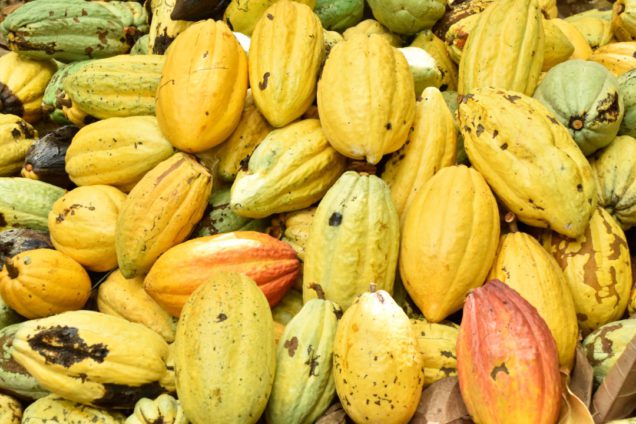
Audio By Carbonatix
An evaluation of the outcomes of Fairtrade’s West Africa Cocoa Programme has found stronger cooperatives among participating producers.
Small-scale cocoa producer organizations across Côte d’Ivoire and Ghana are more resilient as businesses and better attuned to their members’ needs as a result of Fairtrade’s West Africa Cocoa Programme (WACP), a new report released today has found.
According to the West Africa Cocoa Programme Evaluation, commissioned by Fairtrade International and Fairtrade Africa and conducted by Afriqinsights, a pan-African primary market research and consulting firm, there is “clear evidence” that the WACP has delivered tangible benefits to small-holder cocoa producers through improvements in their organizations, including better organizational governance, stronger financial management, strategic planning and more active member participation.
“We are pleased with the evaluation’s findings, especially demonstrating the links between better run organizations, better informed and engaged farmer members and that these cooperatives felt empowered as businesses and that their farmer members were empowered.” said Jon Walker, Fairtrade International’s Senior Adviser on Cocoa.
Fairtrade launched the West Africa Cocoa Programme in 2016, seeking to build strong and viable producer organizations that are responsive to their members’ and business partners’ needs. The Programme provides training, coaching and advisory support to the more than 230 Fairtrade certified cocoa cooperatives and their farmer members. As part of the Programme, a subset of around 30 cooperatives receive an intensive set of services designed to further professionalize them as businesses and increase resilience.
Fairtrade and its affiliated organizations around the world have long maintained that well-managed and democratically run producer organizations are better placed to build long-term relationships with commercial partners, leading to sustained access to Fairtrade markets, increased farmer household incomes and overall progress towards living incomes.
In addition, stronger organizations typically have more ability to invest in infrastructure or climate-smart agricultural practices, and can potentially provide support to farmers to improve cocoa quality, among other things.
“We agree with the recommendations from the WACP evaluation that more consumer brands and retailers need to engage in the voluntary implementation of the Fairtrade living income strategy, which includes the increase in yield combined with farm efficiency, long-term contracts and paying a higher price to farmers,” Walker continued, adding that some leading brands were already implementing aspects of this strategy.
For its part, the WACP evaluation yielded initial positive results pointing to the success of the Programme and the beneficial effects it has had on participating organizations. For instance, cooperatives reported improvements in financial health, such as having internal management systems and stronger finance and bookkeeping capacity, which has improved access to banking services. Training on Good Agricultural Practices has also resulted in higher yields and better quality, both of which increase incomes.
“Democratic and well-managed cooperatives are the best way to ensure farmers have a strong collective voice in trade, and also that they have the knowledge and resources to address human rights issues in their communities,” affirmed Anne-Marie Yao, West Africa Regional Cocoa Manager for Fairtrade Africa.
“The West Africa Cocoa Programme builds farmers’ understanding of child rights and women ’s equality while also supporting the implementation of critical efforts like gender policies and child labour monitoring and remediation systems that have positive effects in their communities.”
The WACP report comes just months after a new study of Fairtrade cocoa farmers’ household incomes in Côte d’Ivoire revealed boosted incomes and lower incidences of extreme poverty. The comparison study, conducted on behalf of Fairtrade by the Impact Institute and surveying 384 farmers from 16 Fairtrade certified cocoa cooperatives, found that household incomes had increased by 85 percent compared to a study of the same cooperatives four years earlier.
Latest Stories
-
NPP still hurting after 2024 loss – Justin Kodua
6 minutes -
Ghana declares war on illegal streaming of pay-TV content
8 minutes -
Vice President leads 44th anniversary commemoration of 31st December Revolution
9 minutes -
Valencia coach Fernando Martin dies in Indonesia boat accident
26 minutes -
Nigeria AG’s intervention brings relief to River Park estate investors – JonahCapital
38 minutes -
High number of youth behind bars is a national loss – Ashanti regional prisons commander
55 minutes -
Nhyira Aboodoo shifts to monumental projects, injects GH₵270,000 into Ashanti orphanages
60 minutes -
Police restores calm after swoop operation at Aboso
1 hour -
Through thick and thin in 2025: KGL Group makes national, global impact
1 hour -
Clean Air Fund sets 2026 targets, pushing gov’t toward funding, tougher laws and real health gains on air pollution
2 hours -
New Year begins with 15.92% water and 9.86% electricity tariff hikes
2 hours -
TUC, PURC call for calm amid power tariff concerns, assure public of stakeholder engagement
2 hours -
New VAT is a game changer for Ghana’s revenue collection – GRA Boss
3 hours -
Adom FM’s Strictly Highlife comes off today at Palms Convention Centre
3 hours -
Relive the 90s: Joy FM’s 90’s Jam takes over this Friday
3 hours

